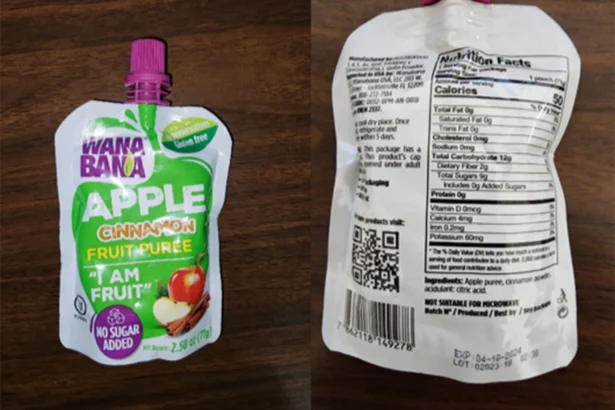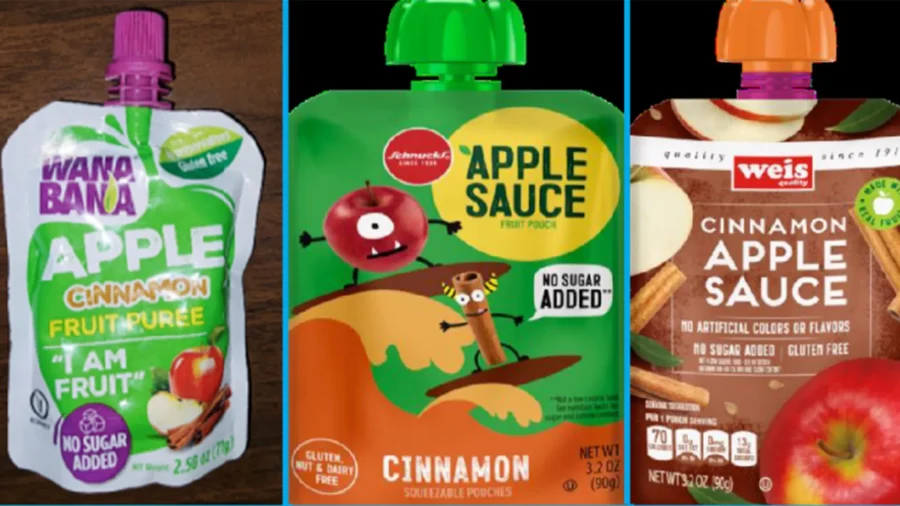More than 60 toddlers across the nation have reported lead toxicity linked to apple puree pouches that were recently recalled due to dangerous lead contamination, according to the U.S. Food and Drug Administration (FDA).
The agency said in a statement that it had received 64 reports of adverse events potentially linked to the recalled products as of Dec. 5, up from 57 cases reported last week.
To date, the reports span 27 states and involve children under the age of 6 the FDA announced in its latest update on the investigation.
As of Dec. 5, cases have been reported in Alabama, Arkansas, California, Connecticut, Florida, Georgia, Iowa, Illinois, Kentucky, Louisiana, Massachusetts, Maryland, Michigan, Missouri, North Carolina, Nebraska, New Hampshire, New Mexico, New York, Ohio, Pennsylvania, South Carolina, Tennessee, Texas, Virginia, Washington, and Wisconsin.
The affected products were marketed to parents and children under the brands WanaBana apple cinnamon fruit puree and Schnucks- and Weis-branded cinnamon applesauce pouches. They were sold nationwide by grocery chains such as Dollar Tree, as well as online retailers such as Amazon.
“Consumers should not eat, sell, or serve recalled WanaBana, Schnucks, or Weis-brand apple cinnamon pouches and should discard them,” the FDA said.
“To properly discard the product, consumers and retailers should carefully open the pouch and empty the content into a trash can before discarding the packaging to prevent others from salvaging recalled product from the trash. Clean up any spills after discarding the product then wash your hands,” it added.
Although Wanabana voluntarily recalled all its apple cinnamon fruit puree products on Oct. 31 regardless of the expiration date and lot code, the FDA noted that the applesauce pouches—including recalled three packs—are still on the shelves at Dollar Tree stores in several states nationwide.
The FDA pointed out that officials are working with the company to remove the recalled product at Dollar Tree stores, adding the product “should not be available and consumers should not purchase” any of the recalled fruit pouches.

FDA Inspecting Plant in Ecuador
In its latest update, the FDA said officials initiated an onsite inspection at a facility located in Ecuador that produces the cinnamon apple pouches, noting ingredient sample collection is underway.
The agency said previously that a supplier of cinnamon was the “likely source” of the lead contamination.
“The Ecuadorian authorities report that Negasmart’s cinnamon had higher levels of lead than allowed by Ecuador and that Negasmart, the supplier of cinnamon to Austrofoods, is currently under an Ecuadorian administrative sanctions process to determine the responsible party for the contamination,” the FDA said.
According to the U.S. Centers for Disease Control and Prevention (CDC), there is “no safe blood lead level” for young children. The agency said it uses a marker of 3.5 micrograms per deciliter to identify children with elevated blood lead levels—higher than most American children aged between 1–5 years.
In a report released on Nov. 13, the CDC said an investigation found 22 children who had consumed the lead-contaminated applesauce pouches had blood lead levels as high as 29 micrograms per deciliter, far above the CDC’s marker of 3.5 micrograms per deciliter.
The children experienced signs and symptoms including headache, nausea, vomiting, diarrhea, change in activity level, and anemia, according to the CDC.
Lead is toxic to humans and exposure at any age or health status can lead to serious symptoms. In adults, high blood lead levels can increase their risk for high blood pressure, other cardiovascular effects, kidney problems, adverse reproductive outcomes, and gout.
Although most children with lead exposure have no obvious immediate symptoms, parents and caretakers should consult a health care professional if they suspect a child may have been exposed to lead, according to the FDA.
Short-term exposure to lead could result in headaches, abdominal pain/colic, vomiting, and anemia, while longer-term exposure could result in irritability, lethargy, fatigue, muscle aches or muscle prickling/burning, constipation, difficulty concentrating/muscular weakness, tremor, and weight loss.
According to the American Academy of Pediatrics, heavy metals like lead can get into food products from the soil, air, water, or industrial processes.

